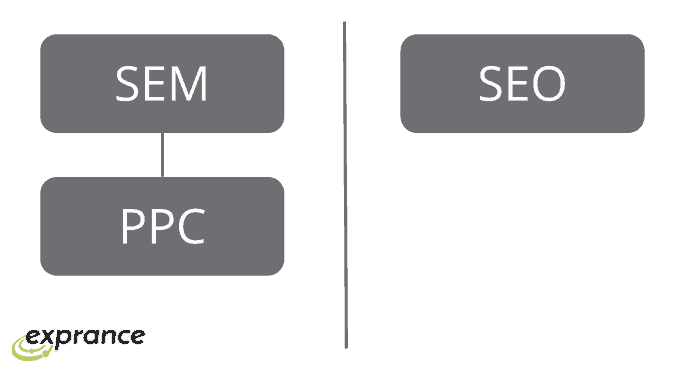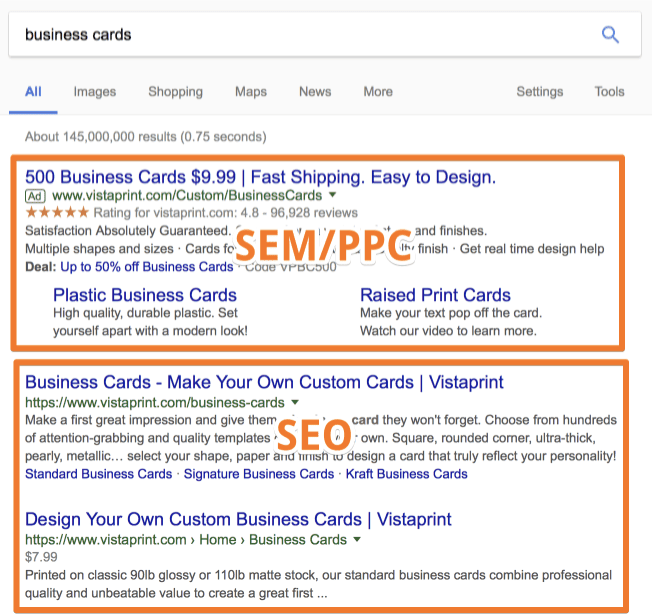It’s all in the details. The difference between SEO and SEM can be boiled down to paid vs organic or ads vs optimization.
That’s simplifying it a bit too much though.
At one point in our great and varied history of search engines, SEM was an umbrella term for paid ads and organic search ranking.
So, the landscape used to look a bit like SEM with SEO and PPC underneath that. That’s changed a bit and now SEM and PPC are often used as synonyms while SEO is the organic opposite of both of those. Even Wikipedia doesn’t seem too clear on all of the semantics.
The semantics don’t matter for this post though nor do they probably matter to you (or I).
I’m looking at things how people use them in everyday life and from my conversations, reading, etc, it all looks a bit like this:

SEM and PPC are directly related meaning paid advertising on search engines. SEO means organic ranking in search engines.
There’s a lot more to each of them though.
So, before I get deeper into the difference between SEO and SEM I’m going to get into what each of them is.
There’s a lot to cover in exactly what SEO and SEM involve so an in-depth look is important.
What Are SEO and SEM?
SEO is Search Engine Optimization which involves many different parts of getting a web page to show up in organic search results when people search.
SEM is Search Engine Marketing and consists mostly of paying for ads to show up in search results when people search. SEM typically means PPC which is Pay Per Click because you’re paying each time somebody clicks on your ad.
Each one is complex in their own way and there’s too much to cover the details in this post.
It’s easy to show what SEM and SEO look like from one Google search.

The section at the top of search results are usually ads and have the small green Ad box at the beginning of the link.
Organic search results, or SEO, looks almost the same minus the Ad box next to the link.
There are different types of search results depending on your search though. You may run into the following types of results in Google search results:
- Maps results (some are SEM and others SEO)
- Product results (these are mostly SEM)
- Rich snippets (can be both SEO and SEM)
- Knowledge card/graph (always SEO)
- Featured snippet (always SEO)
That’s what SEO and SEM look like in Google search results. Different parts of every search engine results page (SERP) are for sale and some are for organic results only.
But what’s the real difference between SEO and SEM in terms of difficulty, cost, and more?
What’s The Difference?
The first thought that comes to mind of the difference between SEO and SEM is cost.
SEO is free website traffic and SEM costs money for website traffic right?
Wrong.
SEO isn’t free, the cost just comes at a different time and the payoff isn’t as quick. The benefits of SEO are much more long-term though. Not only that but there’s a lot more trust in organic search results than in ads.
The biggest difference between SEO and SEM comes from the longevity and investment of each.
SEO takes a long time to ramp up and start working whereas SEM is very quick to start working.
SEO costs more money up front to get started (in either time or money depending on if you do it yourself or not) but once you get traffic you’ll keep getting it with minimal upkeep and cost. SEM will continue to cost money as long as you want visitors to your website.
Each one has its benefits and drawbacks as you can see. The difference is all about ramp-up time and long-term investment.
There are challenges for both SEO and SEM. Before you decide on one or the other then you need to understand the challenges of each.
The Challenges Of SEO and SEM
Both SEO and SEM come with their own unique challenges. It doesn’t always come down to cost or time either.
Both have challenges related to quality, strategy, and more.
With SEO even if you do everything right on your website you won’t rank for the #1 spot in most cases. For SEM you can’t simply throw up an ad to your home page and have success.
So, what are some of the challenges that come with each?
Challenges of SEO
There’s always that hard to shake expectation that within a month your website will rank in the top spot of your market. Unfortunately, that’s not how SEO works which is where its challenges come in.
For competitive keywords (most of them are these days) you have to have amazing content to rank for them. Here’s the biggest challenge… even amazing content won’t rank.
It’s necessary to build links to your website which means outreach, being featured as an expert in your industry, and talking to lots of people in and out of your industry. All of that can take a lot of time and effort.
If you get a page ranked high that’s great but the title of the page and meta-description will determine if people even click on it. If they don’t click on your page, it’ll be demoted in the search results.
Amazing quality content is a good start though because without it search engines surely won’t rank your website.
Challenges of SEM
There are two big challenges with SEM itself and then a big one that also affects SEO. I’ll cover that next.
But first, the two big challenges of SEM that you have to get right.
- You have to start with the right keywords that have the correct search intent. Is someone searching for SEO service or are they just trying to learn the meaning of SEO? You have to use the right keywords for the right intent rather than simply what you sell.
- It’s necessary to write an ad that matches the keywords and stands out among other ads. You can’t look like everyone else and expect to stand out. Something has to make people want to click on your ad and not your competitors.
Those are some huge challenges to overcome and then they both have challenges that are very similar.
Challenges of both
With both SEO and SEM you’re probably bringing visitors back to your website. Of course, there are ad types for driving calls and visitors to a physical location, a website is still necessary.
For SEO your web page is absolutely important for both ranking and getting visitors to do what you want. For SEM your web page is important for getting people to your call to action to convert into a lead.
In both cases optimizing every page of your website for conversion is essential to the success of SEO and SEM.
You always want your landing pages (the page a visitor lands on) to be effective, have a clear focus, and a clear goal.
Using your homepage as the landing page is a definite way to fail, especially with SEM.
Now you know a lot about the difference between SEO and SEM and also the challenges of them both.
That leaves one big question. Which of the two is right for your business?
Which One Is For You?
You may have already decided which one is for you at this point. Or, maybe you decided that a two-pronged approach is for you (good job!).
I think among everything I covered the two-pronged approach is the most reasonable decision you could make in many cases.
No, SEO and SEM aren’t mutually exclusive.
It’s more than likely that timing and money will play into your decision.
You may want to use SEM in the early days while you’re building your SEO strategy. After SEO begins to pay off then you can weigh whether to continue the boost you get from SEM or to focus only on SEO.
It most likely wouldn’t ever make sense to stop SEM or SEO though. Business is business as long as you have a clear positive ROI (Return On Investment).
The strategy I’ve used for a long time is to focus on SEO first. Make that investment first because it takes longer to get started but will have the biggest payout in the long run. You’ll get more trust from SEO than you will SEM.
Once you’ve begun to establish some SEO roots then it’s time to use those roots to have a successful SEM strategy.
Whichever route you go, it’s always good to consult with a professional about your specific business needs. That will give you a good idea of the path you should take to marketing your business online.



